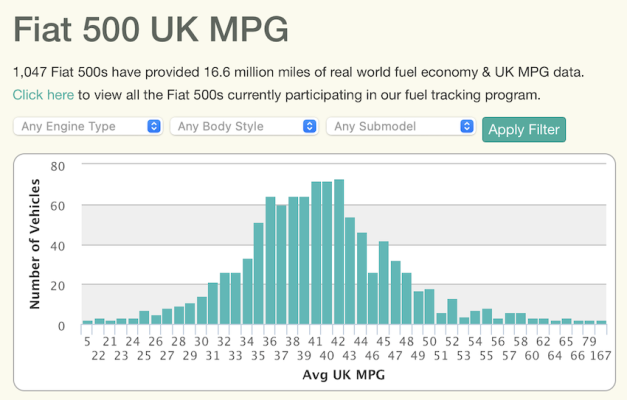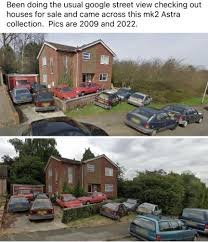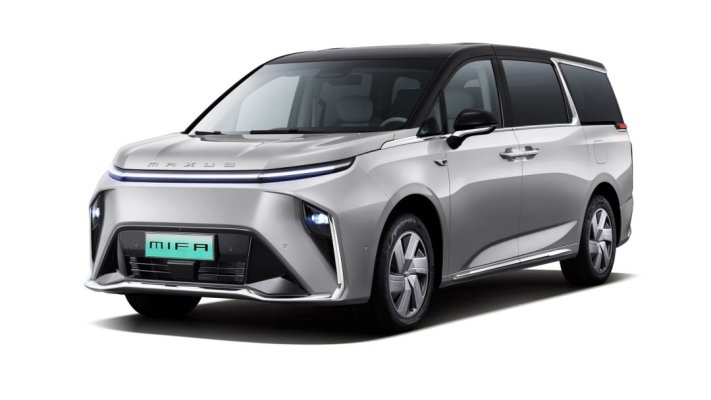Sorry, are you accusing me of being an ardent EV driver?I thought this thread was about EVs. Not ad hominem attacks on posters - noticeably from the ardently pro-EV pile drivers.
Navigation
Install the app
How to install the app on iOS
Follow along with the video below to see how to install our site as a web app on your home screen.
Note: This feature may not be available in some browsers.
More options
You are using an out of date browser. It may not display this or other websites correctly.
You should upgrade or use an alternative browser.
You should upgrade or use an alternative browser.
The EV fact thread
- Thread starter Petrol Pete
- Start date
- Joined
- Jul 1, 2010
- Messages
- 4,934
- Car
- W209
Anyone using the motorways on a regular basis would probably have bought something else. My wife could use a car with a 40 mile range without issue!.....can remember the last time she drove further than Chichester from Bognor!!!
Least an ICE car can get you a safe distance from Bognor ........
And you are still yet to even drive a single EV?

It'll happen one day!
I flew ICE r/c aircraft from 1975 till 2005, by which point electric power had become more practical. I started flying electrics in the late '90s with NiCd and then NiMH packs, but really you had to take a leisure battery to the field for those. This was my field charging setup then (the charger cost a small fortune ... something like £900 IIRC):

Lipo prices tumbled after a few years so I'd just take 4 or 5 pre-charged packs per plane to the field instead. Those gave more power and less weight for higher capacity, so the planes flew better and for longer. I sold off all my ICE stuff at that point, bar a couple of small diesels.
- Joined
- Jul 1, 2010
- Messages
- 4,934
- Car
- W209
MikeInWimbledon
Hardcore MB Enthusiast
- Joined
- Nov 8, 2014
- Messages
- 14,174
- Car
- SL350 (Ex S211 E500,W212 E500, C216, S212E500, W211E500 5.5, W221S500, S211 E500, SL500, S500, E55)
As I said, the typical urban / suburban mpg on a FIAT 500 is 40 mpg, although some might argue it's really more like 38.Before anyone looks at the linked website and says the Fiat 500 mpg is very poor for such a small car then note it defaults to US mpg. Switched to UK mpg it's better but frankly not impressive. My w204 has a higher average over 10 years.
I know this from friends who have them - and love them. It's a very popular urban wife's car or teenage girl first car.
But I did doublecheck the mpg as correct from that website, because my BMW 3 series returns a consistent 44mpg.

MikeInWimbledon
Hardcore MB Enthusiast
- Joined
- Nov 8, 2014
- Messages
- 14,174
- Car
- SL350 (Ex S211 E500,W212 E500, C216, S212E500, W211E500 5.5, W221S500, S211 E500, SL500, S500, E55)
Yes. For 2020 FIAT 500's , it's £190.Road tax is currently only £20 on small ULEZ exempt petrol cars, but I don't know how that will change from ?March (when EVs start paying road tax of course).
It's all about the emissions, you see. 119g / km
But agreed, after April, they're equal to their petrol equivalent at £195 p.a.
So, for 4,000 miles a year, the annual saving drops to £1400 a year: £600 for fuel plus £800 for fixing and servicing.
(And as any FIAT 500 owner knows, the bloody things do need fixing and servicing)
Of course if Rachel from Complaints increased fuel taxes and road taxes any further, that's more to be paid.
Last edited:
- Joined
- Sep 27, 2016
- Messages
- 13,442
- Location
- UK
- Car
- Tesla Model S, Model 3 LR, Model X /// Previous: Jaguar XFR, Mercedes E320 CDI, C32 AMG, CLK 320
I’ve 500 miles in the last 2 days - yet people still say EVs are only good for local trips.Isn’t this thread going through the phase of people trying to convince others that things won’t work in theory, when they already are in practice?
- Joined
- Jun 24, 2008
- Messages
- 50,472
- Location
- London
- Car
- 2022 Hyundai IONIQ 5 RWD / 2016 Suzuki Vitara AWD
I am assuming the smaller battery model Fiat 500e 80 mile range in winter is from a 100% charged battery. A SOC EV owners rarely charge to. The range at 80% SOC logically would be 64 miles. I can cycle farther that that on a Sunday ride out.
I envy you, young man....
Regarding the range, it's horses for courses. A driver doing only 2,000 miles a year, will be doing around 40 miles a week on average. This means charging once a week from 30% to 80%. Most people will find that it fits them perfectly, especially if that's their city car and they also have access to a larger car (ICE or EV) in their household for long journeys with luggage and dogs etc.
SmartAmg
MB Club Veteran
I’ve 500 miles in the last 2 days - yet people still say EVs are only good for local trips.
Waiting for the, Yeah but.... reply to this post. Suprised it's taking, so long.
Or:Waiting for the, Yeah but.... reply to this post. Suprised it's taking, so long.
“And another thing”…
Yeah but...an average speed of just over 10mph must have had a few other road users getting very upsetI’ve 500 miles in the last 2 days - yet people still say EVs are only good for local trips.
- Joined
- Jun 24, 2008
- Messages
- 50,472
- Location
- London
- Car
- 2022 Hyundai IONIQ 5 RWD / 2016 Suzuki Vitara AWD
Yeah but...an average speed of just over 10mph must have had a few other road users getting very upset
Yeah, but how many toilet stops.... ?
Last edited:
I expect my cars at Le Mans to do 5500kms in 24 hrs....but the cars have 3 drivers, use 2500 litres of petrol and plenty of time for 'comfort' breaks.Yeah, but how many toilet stop.... ?
Unless you are the race engineer, on duty for 36hrs continuously
- Joined
- Jan 21, 2005
- Messages
- 30,815
- Location
- Mittel England
- Car
- Smart ForFour AMG Black Series Night Edition Premium Plus 125 Powered by Brabus
It’s all a matter of perspective. Tell me where the compromise is in the following.An other view is that said daughter has been gaslighted into believing a range of 80 miles is acceptable. I'm guessing she's never owned a phone that the battery lasted a week before needing recharging. For sure, today's phones are infinitely more capable but not once have I heard anyone say the reduced battery life is better than what went before. Compromises, yes, but don't try and celebrate them as virtues.
She drives 20 miles per weekday mostly B roads and narrow country lanes, and a typical total of 100-120 miles per week. She very occasionally travels on business to two locations 43 miles away and 74 miles away. She can charge at home, at work, and both locations she travels to. She can charge at multiple charging points along the routes to and from both business locations should she be unable to charge at start or end points.
With a worst-case 80 mile range and best-case 140 mile range, it’s ample for comfortably more than 99% of journeys, and there are plenty of options for the less than 1% of journeys which require more range.. Why would she carry around more weight, which requires more raw materials, more energy to move & stop, heavier components, more wear & tear on the car and more wear & tear on the road, all for the very rare occasion upon which it would be a just a little more convenient.
From my perspective - others are available - that’s fitness for purpose. There is zero compromise. I would say that a petrol or diesel car with 600 mile range would be less fit for purpose for my daughter and the way she uses her car, without any meaningful benefit - in fact it would introduce compromises. Useless for you in your scenario, perfect for her in her scenario. Likewise your choice of car would be useless to her.
A Fiat 500e with 24 kWh battery is a city car. It’s intended for short journeys and was designed for short journeys. We bought it for short journeys and a bit of an experiment to see what living with a EV is really like, so I can form views based upon real life experience. Some members claim that there is an unfulfilled need for smaller lighter less expensive cars - and EVs specifically - but don’t buy them. I purposely bought the lower capacity version.
Back to your opening comment regarding ICE baggage. Had I not chosen to do the opposite,I would have bought the larger capacity option (double the battery size) or perhaps a Tesla Model 3 believing that range is all important. I deliberately didn’t let my baggage hold me back from embracing something different, and I’m glad I didn’t. She views it as simply having the right car most of the time, and recharging in long journeys isn’t an issue, and hence no ICE baggage.
- Joined
- Jan 21, 2005
- Messages
- 30,815
- Location
- Mittel England
- Car
- Smart ForFour AMG Black Series Night Edition Premium Plus 125 Powered by Brabus
Reduced battery life of phones isn’t better, but I would argue that it’s not worse in practice. Most people charge their phone every night and very heavy users top up in between, at the desk, in the car, etc.I'm guessing she's never owned a phone that the battery lasted a week before needing recharging. For sure, today's phones are infinitely more capable but not once have I heard anyone say the reduced battery life is better than what went before. Compromises, yes, but don't try and celebrate them as virtues.
The number of people who have to charge their phone during the course of the day in such a way that it actually compromisess their use is small - or they’re using a very old phone very intensively.
So most people feel all of the benefit of the much much much greater capability you mention all of the time, but hardly ever - if ever - feel the impact of the battery life not lasting a week or even a day.
Only part of the battery life of old mobile phones was the lack of functionality. The bigger influence was that most people barely used them. Most people had no reason to or couldn’t afford to.
I had to charge all of my Nokias every night and at points during the day out of necessity because I used them a lot. The batteries had to be replaced too because of the number of charging cycles.
PA 25 years ago it was common for phone batteries to be flat when people tried to use them - there wasn’t a frequent and regular drumbeat. Now, not so much, because they charge every nigh(.
- Joined
- Jan 21, 2005
- Messages
- 30,815
- Location
- Mittel England
- Car
- Smart ForFour AMG Black Series Night Edition Premium Plus 125 Powered by Brabus
That’s why for some years now car manufacturers talk about mobility rather than car ownership. Buy or finance the car you need for most of the time and do something different for the exceptions, like using public transport, hiring a car, etc.The car might be used mainly within a given short radius of the owner's home - but just a few times a year when it used for longer trips means the range beyond that perimeter starts to become an important factor of ownership.
That’s equally true for drivers of small cars wishing to travel an exceptionally long distance, and for drivers of large cars (or cars with local emissions) entering city centres by exception. In either scenario you use the right tool for the job.
- Joined
- Jun 24, 2008
- Messages
- 50,472
- Location
- London
- Car
- 2022 Hyundai IONIQ 5 RWD / 2016 Suzuki Vitara AWD
It’s all a matter of perspective. Tell me where the compromise is in the following.
She drives 20 miles per weekday mostly B roads and narrow country lanes, and a typical total of 100-120 miles per week. She very occasionally travels on business to two locations 43 miles away and 74 miles away. She can charge at home, at work, and both locations she travels to. She can charge at multiple charging points along the routes to and from both business locations should she be unable to charge at start or end points.
With a worst-case 80 mile range and best-case 140 mile range, it’s ample for comfortably more than 99% of journeys, and there are plenty of options for the less than 1% of journeys which require more range.. Why would she carry around more weight, which requires more raw materials, more energy to move & stop, heavier components, more wear & tear on the car and more wear & tear on the road, all for the very rare occasion upon which it would be a just a little more convenient.
From my perspective - others are available - that’s fitness for purpose. There is zero compromise. I would say that a petrol or diesel car with 600 mile range would be less fit for purpose for my daughter and the way she uses her car, without any meaningful benefit - in fact it would introduce compromises. Useless for you in your scenario, perfect for her in her scenario. Likewise your choice of car would be useless to her.
A Fiat 500e with 24 kWh battery is a city car. It’s intended for short journeys and was designed for short journeys. We bought it for short journeys and a bit of an experiment to see what living with a EV is really like, so I can form views based upon real life experience. Some members claim that there is an unfulfilled need for smaller lighter less expensive cars - and EVs specifically - but don’t buy them. I purposely bought the lower capacity version.
Back to your opening comment regarding ICE baggage. Had I not chosen to do the opposite,I would have bought the larger capacity option (double the battery size) or perhaps a Tesla Model 3 believing that range is all important. I deliberately didn’t let my baggage hold me back from embracing something different, and I’m glad I didn’t. She views it as simply having the right car most of the time, and recharging in long journeys isn’t an issue, and hence no ICE baggage.
I spend time in the South of Italy, the Fiat 500 is a very common car down there, no, not the new one, the original sixties one. And we're not talking about collector cars - we're talking about tatty old Fiat 500s in use as daily runners by normal falk. No, they can go on the Autostrada, and they won't work on long journeys, but they are still a perfect fit for what they are being used for. My point is that when it comes to ICE cars, it's absolutely normal for people to buy a car that is perfectly suitable for its limited purpose, but when it comes to EVs, there's always the argument "Aaaah, but what if you needed to make a long journey?".
- Joined
- Jan 21, 2005
- Messages
- 30,815
- Location
- Mittel England
- Car
- Smart ForFour AMG Black Series Night Edition Premium Plus 125 Powered by Brabus
I’m practice, do you see better fuel consumption in winter? I don’t.Re earlier discussion on ICE efficiency in cold weather. It actually improves - significantly.
Take Autocar's finding that at 70mph, 19% of the total energy used is for HVAC read: heating. With ICE, say the engine efficiency for motive power is 30%. 19% of that is 5.7%. Efficiency is what we get out divided by what we put in. Therefor we are improving ICE efficiency by 5.7%.
The reverse is true in fact, and that’s not because of winter diesel as I don’t have any diesels in the collection. Have you ever driven a Mark 2 Astra diesel? Terrible, terrible things

Tell me where the compromise is in the following.
Price perhaps? No idea if you bought new or used, or leased. But from a very quick skim of Autotrader a used 500e seems to be roughly double the cost of a petrol 500 of equivalent age (excluding insurance write offs)?
I know EV longevity is speculative, and also largely irrelevant to people who only want to drive new (or nearly new) cars. But at the lower end of the market there's a huge population of ICE city cars out there that are still humming along nicely at 15+ years old, providing reliable and very economical transport for a fraction of the outlay.
Reduced battery life of phones isn’t better, but I would argue that it’s not worse in practice. Most people charge their phone every night and very heavy users top up in between, at the desk, in the car, etc.
Just as an aside many (most?) modern smart watches seem to need charging every night, yet include sleep tracking functionality?!
Users who are viewing this thread
Total: 5 (members: 0, guests: 5)
Similar threads
- Replies
- 26
- Views
- 4K
- Replies
- 263
- Views
- 18K

